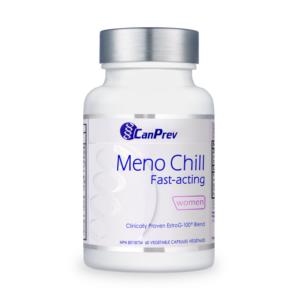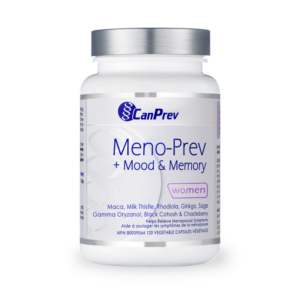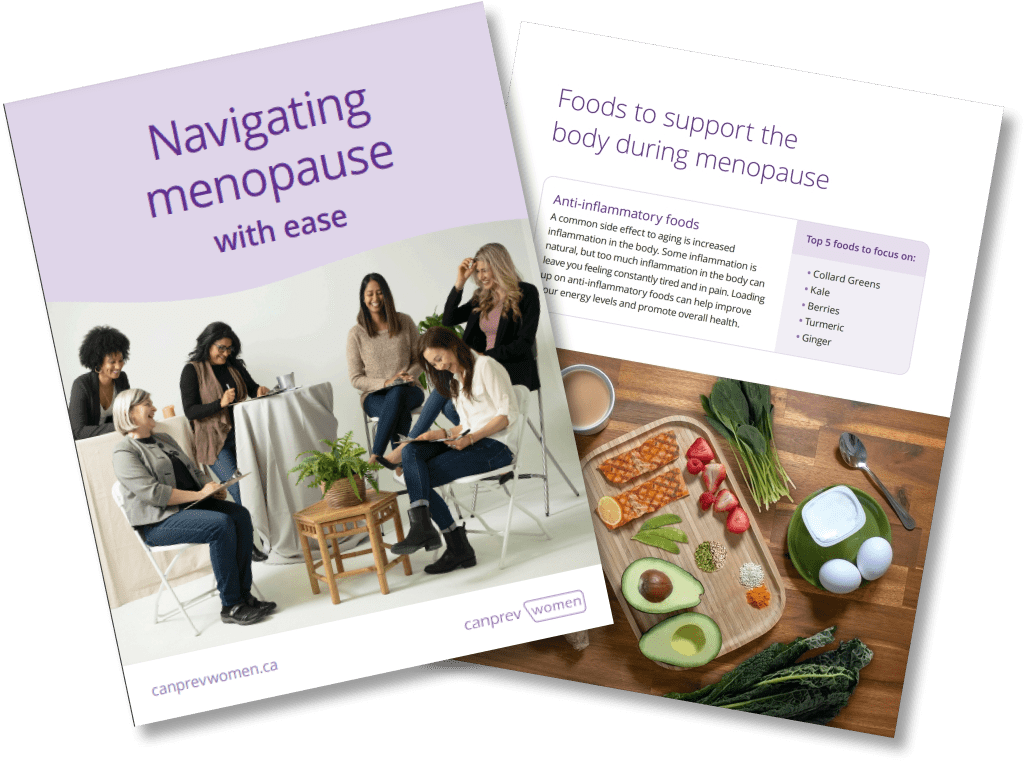Hot flashes get the headline, but there’s a lot more to the story when it comes to menopause.
For many women, menopause brings a whole host of other changes: brain fog, poor sleep, low energy, and emotional ups and downs that feel like they come out of nowhere.
If you’re going through any or all of these symptoms, you’re not alone. These symptoms are the result of real hormonal shifts happening in your body. Once you understand what’s behind them, it becomes a little easier to care for yourself with more patience, compassion, and the right kind of support.
Let’s take a deeper look at what’s going on in your body, and explore gentle, natural ways to help you feel more like yourself again.
Menopause 101
Menopause marks the end of your menstrual cycle and fertility, officially defined as going 12 months without a period. But symptoms often begin much earlier during perimenopause, when hormone levels start to fluctuate. Perimenopause can last for several years, and it’s often where the real rollercoaster begins.
From mood swings to sleep troubles, brain fog, and more, let’s explore what’s happening during this transition and how to find some relief along the way.
Mood swings and irritability
What it feels like:
Your emotions might change suddenly and unexpectedly — from restless energy to sadness, irritability, or even a surreal sense of detachment. Rest assured, these fluctuations are as natural as they are confusing, frustrating or unsettling.
What’s going on:
Your ovaries gradually produce less estrogen and progesterone, hormones that help regulate the brain’s mood messengers like serotonin, GABA, and norepinephrine. But instead of a steady decline, these hormone levels can swing unpredictably — making your mood do the same. Add in the other symptoms of this mid-life hormone circus, and it’s no wonder you might feel anxious, distressed, or like your emotional GPS is glitching.
What can help:
Try to tackle stress at the source. Your adrenal glands (which help your body respond to stress by producing cortisol and other hormones) take on more of the hormone production workload as the ovaries gradually step back. So your adrenals are already working overtime even without added stress. That’s why it’s important to prioritize rest, eating right, and doing small daily rituals that support your calm.
Sleep problems
What it feels like:
As hormone levels fluctuate, so can your sleep. You might wake up at 3 a.m. with your mind racing, or feel exhausted even after clocking a full 8 hours in bed. It’s frustrating, exhausting, and feeds right back into the stress cycle. Because let’s face it: no one feels calm, clear, or emotionally balanced without restorative sleep.
What’s going on:
Hormone shifts don’t just affect your mood, they also impact your sleep. Estrogen helps regulate body temperature and supports serotonin (which plays a role in your sleep-wake cycle), while progesterone has a naturally calming effect. As these hormones drop, something as natural as sleep can feel almost impossible. Add in a surge of anxiety, low mood and hot flashes — or even undiagnosed sleep apnea, which becomes more common as estrogen declines — and sleep becomes even more elusive.
What can help:
First, give yourself some grace. Sleep struggles in this stage aren’t just frustrating — they’re deeply tiring in every sense of the word. But you can set yourself up for better nights. Gentle routines can help, like keeping your bedroom cool, winding down slowly, and trying to protect your evenings from too much stimulation (or overthinking). Sometimes the best sleep support is the kind that starts before your head even hits the pillow.
Brain fog
What it feels like:
You lose your train of thought mid-sentence. Reread the same paragraph three times. Walk into a room and forget why. It’s like your brain is wrapped in cotton — fuzzy, unfocused and fatigued.
What’s going on:
“Brain fog” isn’t a medical term, but it’s a very real experience — especially during menopause. As estrogen and testosterone decline, cognitive clarity can take a hit. These hormones help regulate brain energy, blood flow, and communication between neurons. Without them, memory, focus, and even speech can feel disrupted. This foggy phase is usually temporary, and often improves post-menopause. But that doesn’t mean you have to power through without support.
What can help:
When the fog rolls in, be gentle with yourself. Stressing over forgetfulness only adds pressure. Try switching up your routine, learning something new, or getting outside for a walk—these small changes help spark mental clarity. Regular movement boosts blood flow to the brain, and writing things down can ease the load on busy days. And if the fog feels heavy or comes with low mood, it’s okay to reach out for support. You’re not alone in this.
Vaginal dryness and skin changes
What it feels like:
You may notice increased sensitivity or discomfort, especially during intimacy. Your skin might feel drier, itchier, or more delicate than before — even skincare routines that once worked may suddenly feel off.
What’s going on:
Estrogen plays a key role in maintaining the thickness, elasticity, and hydration of both vaginal tissue and skin. As levels drop, these tissues become thinner and more fragile, making them more prone to dryness, irritation, and sensitivity. Reduced circulation and collagen production during this time can also affect how skin looks and feels.
What can help:
These changes are deeply personal, but you’re not alone in them. Look for ways to build comfort back into your routines, whether that’s switching to softer fabrics, adjusting your skincare routine, or talking openly with a trusted healthcare provider. Intimacy can shift, too, and giving yourself space to explore what feels good to you now can be empowering. This stage is not an ending, but an invitation to reconnect with your body in a new way.
A menopause toolkit
There’s no one-size-fits-all plan for menopause, but there is a way to care for yourself with more intention, kindness, and trust in your body.
- Move your body
Regular movement boosts your mood, circulation and mental clarity. It doesn’t have to be intense, just consistent. Whether it’s walking, stretching, yoga, or dancing in your living room, every bit of movement is a win. - Nourish yourself
Stay hydrated, and pay attention to cravings and appetite changes — these can be your body’s way of signalling nutrient needs or shifts in energy. Also notice physical signs like headaches, bloating or muscle tension that might clue you in on what your body needs.
- Prioritize rest
Good sleep is essential for mood, focus, and overall wellbeing. Create calming bedtime rituals, keep your bedroom cool and dark, and protect your evenings from screens and overstimulation. - Manage stress
Stress doesn’t just stay in your head. It shows up in your hormones, your sleep, your skin, and even how your body feels throughout the day. Finding moments of stillness and care can make such a difference. Deep breathing helps reset your stress response. Journaling creates space for self-reflection. Walking without your phone gives your brain a break from stimulation. And even tiny pauses like stretching or sipping tea can help your nervous system settle. Moments like this add up. Give yourself permission to take them. - Stay connected
Opening up to others doesn’t mean you’re complaining — it means you’re being real. Even small moments of honesty can bring you a sense of relief and help others understand how to support you. You don’t have to lay it all out at once. Try starting a conversation like “This week’s been hard,” or “I haven’t been feeling like myself lately”. It’s a small step that can ease the weight and make space for connection. - Extra support
Menopause can bring a range of symptoms, and targeted formulas can help provide natural, focused support to ease multiple concerns at once.
Formulated with EstroG-100® herbal extracts, KSM-66® ashwagandha and zinc bis-glycinate, Meno-Chill supports:
- Mood swings and irritability
- Stress and emotional overwhelm
- Sleep disturbances
- Hot flashes and night sweats
- Skin and vaginal dryness or sensitivity
Featuring a 250mg dose of maca plus botanical extracts like black cohosh, rhodiola, sage and chasteberry, Meno-Prev supports:
- Brain fog and memory challenges
- Low mood and mental fatigue
- Hot flashes and night sweats
- Hormonal irritability and cognitive focus
If you’re navigating changes and looking for real, compassionate support, you’re not alone. Visit canprevwomen.ca/menopause for expert-backed resources, real community connection and natural options designed to ease and honour this stage of life.
Menopause doesn’t come with a rulebook—but it does come with wisdom, resilience, and a chance to care for yourself in new ways. Whatever part of the journey you’re on, know that your experience is valid. We hope these tools help you feel more steady, seen and supported.
Sources:
Introduction to Menopause
The Emotional Roller Coaster of Menopause
Mood Changes During Perimenopause Are Real. Here’s What to Know.
Menopause and your mental wellbeing
Menopause & Mental Health
Hormone chaos and the parallels between puberty and peri-menopause
What to Know About Menopause and Mood Changes
How Does Menopause Affect My Sleep?
Obstructive Sleep Apnea: Women’s Perspective
Menopause and brain fog: What’s the link?
Brain fog
Reasons You May Have Brain Fog
What is brain fog?
What to Know About Menopause Fatigue
The 2023 Practitioner’s Toolkit for Managing Menopause


